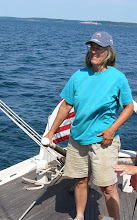How Lake Ontario Got It's Name -a mangled history lesson
Richard
Palmer, historian, author, and editor of various regional history works, sends along this newspaper story from 1857 telling how Lake
Ontario got its name. Since nobody knows the true origin of “Ontario”
this is as good a story as any. Note Saratoga Springs was a famous
health spa at this time. The writing style may be 19th century but the satire is timeless.
"From
ancient documents in our possession of undisputable authority - for
the plausible reason that no one knows anything about them - we are
enabled to give the true derivation of the word, which, it will be
seen, owes it origin to a trifling incident that would probably have
never been recorded, had we not rescued it from the obscure pages of
the oblivious past.
"A
few years after the first settlement of the country by the whites, a
venerable old gentleman from the north of Holland, named Myneer
Vonsnappentweezer, who was extensively engaged in the wholesale
ladder business, in the vicinity of New York, fitted out a
prospecting expedition, consisting of half a dozen whites, two
Irishmen and a Mohawk Dutchman, to explore the interior of the
country, in search of a suitable site for a cork-screw manufactory.
After a long journey through the wilderness, during which time the
party suffered the most terrible hardships, subsisting six weeks on a
bag of salt and a bottle of tomato catsup, the expedition finally
reached the ancient village of Mud Lock.
"Here
the party fell in with a Kangapoojah Indian on his way to Saratoga
Springs with an invalid niece, who informed them of a very extensive
water privilege directly north - referring to the Great Lakes - and
offered to conduct them to the vicinity for the moderate compensation
of three plugs of nail-rod tobacco and a boot full of old Santa Cruz.
"Having
secured the services of the guide, the party resumed their journey by
a circuitous route through the John Brown Tract, and came out at the
village of "Graball," now known as Mexico, though it still
retains the characteristics which its ancient name would suggest;
that this was the spot is established beyond a doubt, from the fact
that an oyster can and an old fashioned junk bottle labeled, "Pure
Old Cognac, vintage of 1532, were found a few years since in that
vicinity, where it is supposed the party halted for refreshment.
Upon
reaching the summit of a hill, the party were thrown into ecstasies
at the sight of a magnificent sheet of water spread out before them
and reaching as far as the eye could extend. The Indian guide on
beholding the scene, suddenly threw up his arms in wild
gesticulations, and apparently with deep emotions exclaimed "On
Thar I-Oh!" The sentence was here abruptly terminated by the
speaker having stepped upon a piece of scantling with a rusty nail
driven through, which penetrated through his halter and entered the
ball of his left foot just back of the first toe, and the concluding
exclamation of "Oh!" was occasioned by the sudden sensation
of pain; the remainder of his remark would have been to the effect
that several years previous, "on thar," - meaning upon the
lake - he had brought down seventeen "helldivers" and a
"shitepoke" with one barrel. (note to reader helldivers aka
grebes and shitepoke's aka herons are fishy tasting birds NOT
considered birds worth eating.)
"Mr.
Vonsnappentweezer, however, misunderstanding the character of the
remark, and observing the extravagant emotions of the Indian, joined
in his supposed enthusiasm, and catching up the broken sentence
exclaimed, "Ah! It is the On-tar-i oh!" "Ontario!"
"Ontario!" reiterated the remainder of the party, and from
that moment the name became established.
"The
Indian shortly recovered from the pain caused by the accident, by the
application of a bottle of Persian Balm, which he happened to have in
his carpet-bag, but the connection which his misfortune held to the
origin of so prominent a name, was never before explained. Mr.
Vonsnappentweezer after his return, published a long account of his
explorations, which was extensively copied into the daily papers,
describing the extensive "water privilege" in the northern
part of the state, by the name so singularly bestowed.
"Thus
it will be seen how the intelligent and enquiring mind can trace out and restore the legendary and doubtful
portions of history, and bring to light incidents that were never
before recorded, and undoubtedly never transpired."


